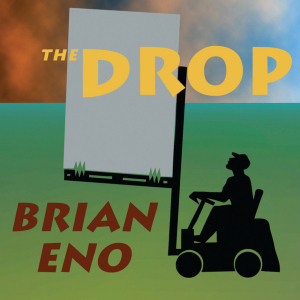Such a half-assed approach only fuels the fire of his critics, and a lot of Spinner—save the tracks obviously overdubbed with bass and drums by Wobble—does seem as if the music is being created with zero human input. Still, tracks like “Where We Lived” and “Like Organza” will inspire comparisons to Apollo, while “Garden Recalled” previews parts of Radiohead’s Kid A. While the album has too much in the way of rhythm to be considered truly ambient, it’s also too easy to ignore.
Several minutes into Spinner’s final track, the music goes silent, emerging several minutes after that with a spooky, spacey piece based around rhythm box and a couple of electric pianos. This would emerge even longer as “Iced World” at the end of Eno’s next album. He described The Drop variously as jazz played by aliens, music that “nobody asked for,” or “music that nobody wants to listen to,” which of course begs the question why we should.
This time he apparently added the rhythms all by himself, and spread them about a variety of shortish pieces that, again, are just there, with the possible exception of “Swanky”, which at least sonically resembles its title. Much of the album is rather generic sounding, although “Dear World” does weave his droning voice into the mix. (The expanded reissue shortened “Iced World” by several minutes so it would fit on vinyl, and added two tracks from an earlier Japanese release, both of which were also included in the digital version. Meanwhile, the CD was augmented by a disc containing music from one of his art installations of the time. As for Spinner, its eventual upgrade ditched the “Iced World” preview in favor of a track each from Eno and Wobble, both decent.)
Eno/Wobble Spinner (1995)—2½
2020 expanded edition: same as 1995, plus 2 extra tracks (and minus 1 track)
Brian Eno The Drop (1997)—2
2014 expanded edition: same as 1997, plus 9 extra tracks
.jpg)

No comments:
Post a Comment